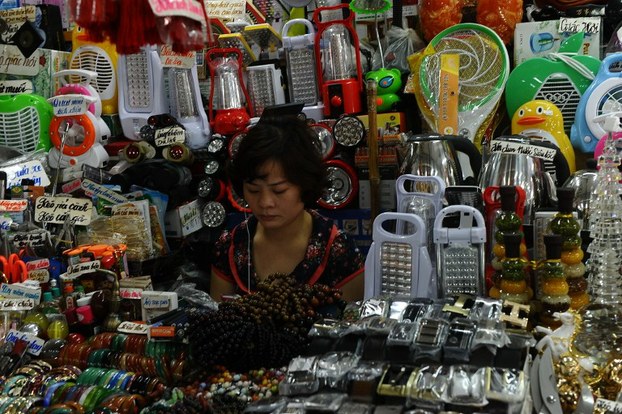




Vietnam’s government is glossing over the country’s trade deficit with China and must do more to stem the growing influence of its northern neighbor over its financial system, an economist said Thursday.
Recent figures released by the General Statistics Office of Vietnam showed that Hanoi’s trade deficit with Beijing had reached U.S. $24.3 billion in the first nine months of 2015—and increase of more than 21 percent compared to the same period a year earlier.
However, the office claimed that when factoring in a surplus from other foreign markets, the deficit only had a U.S. $4 billion effect on Vietnam’s economy as a whole.
Bui Kien Thanh, a Hanoi-based economist, told RFA’s Vietnamese Service that the figures do not tell the full story of Vietnam’s trade relations with China.
“For our garment industry, we have to import a lot of material from China to fill contracts we signed in the U.S.,” Thanh said, adding that 80-90 percent of the materials needed for Vietnam’s footwear industry are also brought in from China.
“Vietnam needs to examine the trade system. We can’t continue bragging that we have a surplus of billions of dollars to the U.S. market … when in fact we are only exporting [goods to other countries] for China … We need to clarify this and craft policies accordingly.”
Exports from Vietnam totaled U.S. $120.7 billion in the first nine months of 2015, though slightly more than 70 percent of that figure was attributed to foreign direct investment (FDI) companies, which are based in other countries but hold a controlling stake in a business in the Southeast Asian Nation.
According to Thanh, the data shows Vietnam would not enjoy a surplus in other markets without the vast trade deficit with China that comes with its exports.
The government of Vietnam “has not done enough to manage trade with China,” he said, particularly in terms of illegal cross-border trade.
“We need to rebuild the system of people who are in charge of imports and exports—not only with China,” he said.
Vietnam’s trade deficit with China has increased in each of the last 10 years, and experts estimate the deficit will reach U.S. $35 billion for all of 2015.
Nationalism factor
Thanh’s call for better management of trade with China comes after Beijing’s deployment in May last year of an oil rig, HD-981, to waters off the Vietnamese coast claimed by both countries prompted a storm of anti-China protests in Vietnam. China withdrew the rig in July, citing bad weather and the completion of exploratory work.
Chinese detentions of Vietnamese fishermen in 2012 and 2014 have also stoked tensions, with both sides accusing the other of ramming vessels during confrontations in the South China Sea.
In addition to imports of machinery and materials, Vietnam also purchases many consumer goods from its northern neighbor, and a growing sense of nationalism has led many Vietnamese to call on their government to do more to counter China’s influence.
“Vietnamese are now dependent on Chinese goods as small as things like needles and thread,” Do Viet Khoa, a teacher based in Hanoi, told RFA, adding that in order to escape China’s influence “you have to produce your own goods or find an alternative source for imports, but this is impossible.”
“Another reason [we can’t escape] is because Chinese goods are cheap and Vietnamese consumers only see the immediate benefits—they don’t think about the issue of nationalism,” he said.
“They just let Chinese goods flood the market.”
But Thanh warned against boycotts of products from China, which were carried out to some degree during the height of tensions related to the oil rig deployment last year, and urged the government of Vietnam to look for a more reasonable solution that would not harm ties between the two nations.
“China is our neighbor, so we need to maintain a good relationship, but we also need strong ties with markets in other countries as well,” he said.
“We have to find a solution that benefits both sides—not simply a boycott of China.”
Report by Nam Nguyen for RFA’s Vietnamese Service. Translated by Viet Ha. Written in English by Joshua Lipes.